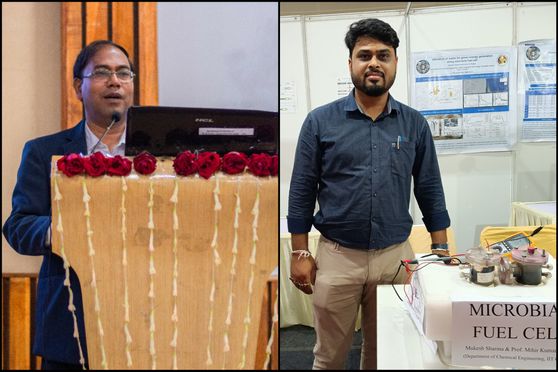IIT Guwahati technology to generate energy from wastewater


Indian Institute of Technology (IIT) Guwahati has developed a bio-electrochemical device, Microbial Fuel Cell (MFC) that can generate green energy by treating wastewater.
The research was led by Mihir Kumar Purkait along with his PhD student Mukesh Sharma, Department of Chemical Engineering, IIT Guwahati. They developed a bio-electrochemical device that converts chemical energy contained in organic substrates into electrical energy through microbes.
Commending the work of the research team, T. G. Sitharam, director of IIT Guwahati, said, “This development has provided an excellent sustainable energy source along with treating several wastewaters. After scaling the process, it can be used as a source of clean energy using municipal wastewater and other such areas economically.”
The use of organic material such as wastewater in MFC makes it an eco-friendly device that offers a dual benefit of bioelectricity generation and waste management. This research was supported by a grant from the Department of Science and Technology (DST), Government of India.
Explaining the long-term impact of the research Mihir Kumar Purkait, Department of Chemical Engineering, IIT Guwahati, said, “Further implementation of this process may provide an excellent alternative to several costlier renewable energy extraction processes. The conducted study reveals that the prepared Cation Exchange Membranes (CEMs) are cheaper and perform better as compared to the several reported membranes, assisting in the separation of charges and potential development.”
The present research of IIT Guwahati is dedicated to synthesizing several novel high-performance CEMs comprising a polymeric blend of several high-end polymers doped with Cellulose Acetate (CA) and other modifiers like Graphene Oxide (GO) to obtain membranes with high Ion Exchange Capacity (IEC) and proton conductivity. Dual-chamber MFC design has been selected since it is the most widely utilised design owing to its usefulness in wastewater treatment and energy generation.
To further reduce the fabrication cost of the membranes CA has been synthesized from waste sugar cane bagasse, and GO was synthesized using a greener approach.
A larger-scale setup is in the developing stage. Further, funding sources would encourage and support the process to develop a working setup near the municipal wastewater treatment plant at IIT Guwahati, which would further help to understand the complications involved during the large-scale functioning of the technology.